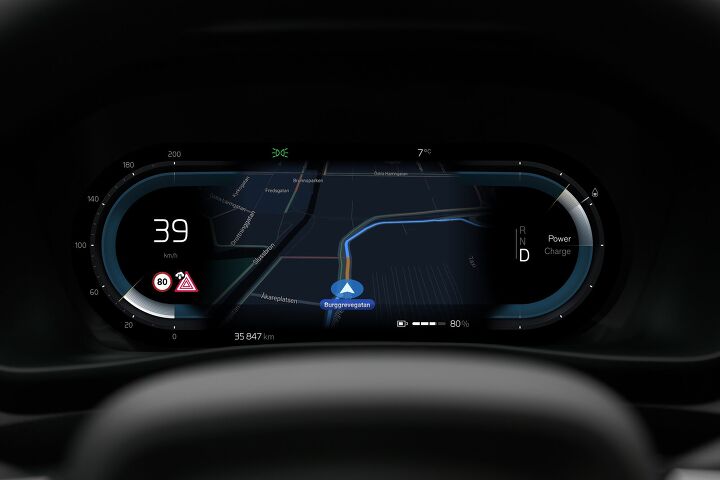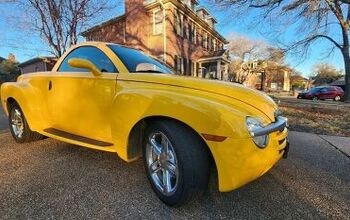Yay or Nay? Volvo Launches Accident Ahead Alert Service

Volvo is introducing a new feature that alerts drivers of accidents reported on the road ahead. With similar services available for free on select phone apps, many of which can be integrated with your vehicle’s infotainment display, Volvo’s offering doesn’t sound incredibly novel on its face. But it’s leveraging real-time data from government-operated traffic management centers via the automobile’s proprietary user interface, technically making the feature the first of its kind within the automotive industry.
Due to Volvo's Accident Ahead Alert service requiring the vehicle to communicate with a national traffic management hub, it’s presently only available in Denmark. However, the plan is to expand the feature to encompass the whole of Europe and incorporate additional data via partnering with the European Data for Road Safety ecosystem. This is in tandem with allowing connected Volvo products to communicate information with each other.
“We’re happy that Volvo Cars as the first car maker has started using our new real-time traffic event data feed,” Stine Bendsen, head of the Danish Traffic Management Centre at the Danish Road Directorate, said as part of the release. “A quick alert about an accident ahead gives the driver more time to slow down and increase the distance to the car in front. This helps to lower the risk of follow-up collisions and protect the people working to clear the road.”
This is very true. But we already have ways of doing this with arguably better accuracy. Most of the big tech companies have navigation applications that incorporate accident warnings that are usually submitted by other people that are currently traveling on the road. This would presumably offer more frequent data points than having to rely entirely on connected Volvos and government traffic hubs — depending on how the latter party monitors their roads.
In the event of a horrible wreck having taken place on a stretch of highway covered by loads of traffic cams, those traffic hubs are probably the first to know and likely to have more comprehensive details than any passerby. But it could be some time before the government is alerted to an accident on a less populated roadway and then manages to input the information that then has to be relayed to your car. Granted, it’ll still be happening quickly and digitally. But the same can be said of something like Waze, Google or Apple Maps.
Another big question is what else is Accident Ahead Alert going to offer? Many navigation applications will often warn drivers of impending speed traps, helping them avoid tickets. What are the odds those traffic enforcement centers are going to be telling Volvo where every police vehicle with a speed detector is going to be posted?
This is certainly a nice service to have. It’s just one that many of us have already. Likewise requiring cars to be networked to a government database is probably going to steer some people away from the brand. But most customers won’t be aware how the system works, let alone be bothered enough to give it a second thought.
Volvo hasn’t officially called this a pilot program. But rolling it out in Denmark makes it seem like that’s probably the case. Assuming the company manages how to work data transfer with government data hubs — the vehicle-to-vehicle communications are already figured out — for the Danes, it should scale up to encompass the whole of Europe. From there, the company will presumably see if it can begin service for other Western markets.
[Image: Volvo]
Become a TTAC insider. Get the latest news, features, TTAC takes, and everything else that gets to the truth about cars first by subscribing to our newsletter.

A staunch consumer advocate tracking industry trends and regulation. Before joining TTAC, Matt spent a decade working for marketing and research firms based in NYC. Clients included several of the world’s largest automakers, global tire brands, and aftermarket part suppliers. Dissatisfied with the corporate world and resentful of having to wear suits everyday, he pivoted to writing about cars. Since then, that man has become an ardent supporter of the right-to-repair movement, been interviewed on the auto industry by national radio broadcasts, driven more rental cars than anyone ever should, participated in amateur rallying events, and received the requisite minimum training as sanctioned by the SCCA. Handy with a wrench, Matt grew up surrounded by Detroit auto workers and managed to get a pizza delivery job before he was legally eligible. He later found himself driving box trucks through Manhattan, guaranteeing future sympathy for actual truckers. He continues to conduct research pertaining to the automotive sector as an independent contractor and has since moved back to his native Michigan, closer to where the cars are born. A contrarian, Matt claims to prefer understeer — stating that front and all-wheel drive vehicles cater best to his driving style.
More by Matt Posky
Latest Car Reviews
Read moreLatest Product Reviews
Read moreRecent Comments
- Peter Buying an EV from Toyota is like buying a Bible from Donald Trump. Don’t be surprised if some very important parts are left out.
- Sheila I have a 2016 Kia Sorento that just threw a rod out of the engine case. Filed a claim for new engine and was denied…..due to a loop hole that was included in the Class Action Engine Settlement so Hyundai and Kia would be able to deny a large percentage of cars with prematurely failed engines. It’s called the KSDS Improvement Campaign. Ever hear of such a thing? It’s not even a Recall, although they know these engines are very dangerous. As unknowing consumers load themselves and kids in them everyday. Are their any new Class Action Lawsuits that anyone knows of?
- Alan Well, it will take 30 years to fix Nissan up after the Renault Alliance reduced Nissan to a paltry mess.I think Nissan will eventually improve.
- Alan This will be overpriced for what it offers.I think the "Western" auto manufacturers rip off the consumer with the Thai and Chinese made vehicles.A Chinese made Model 3 in Australia is over $70k AUD(for 1995 $45k USD) which is far more expensive than a similar Chinesium EV of equal or better quality and loaded with goodies.Chinese pickups are $20k to $30k cheaper than Thai built pickups from Ford and the Japanese brands. Who's ripping who off?
- Alan Years ago Jack Baruth held a "competition" for a piece from the B&B on the oddest pickup story (or something like that). I think 5 people were awarded the prizes.I never received mine, something about being in Australia. If TTAC is global how do you offer prizes to those overseas or are we omitted on the sly from competing?In the end I lost significant respect for Baruth.


































Comments
Join the conversation
Good for the Danes.
So Waze but less